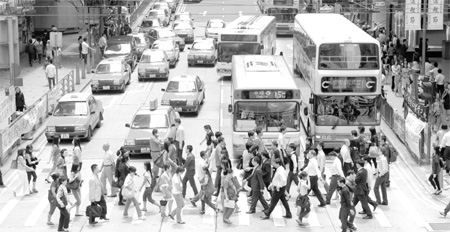Jobless rate retreats to 3-year low
Updated: 2011-04-20 06:50
By Li Tao(HK Edition)
|
|||||||||
|
People cross a busy intersecton in the Central district in Hong Kong. Driven by strong economic expansion, total employment in the city increased to 3.58 million. Mike Clarke / AFP |
Unemployment falls to 3.4% in January-March
Hong Kong's jobless rate fell to 3.4 percent in the January-March period, the lowest level since September 2008, driven by strong economic expansion which spurred job growth in the city.
The rate was down a further 0.2 percentage point from the 3.6 percent recorded during the previous three-month December-February reporting period, the Census and Statistics Department said on its website Tuesday.
The figures beat the 3.5 percent median estimate of 13 economists in a Bloomberg News survey and the median 3.6 percent forecast of 10 economists surveyed earlier by Dow Jones Newswires.
"Hong Kong's unemployment rate again surprised on the downside, not only moving further below the long-term trend of 4.2 percent but also returning to pre-crisis levels," Donna Kwok, Greater China economist from HSBC wrote in an e-mail report released the same day.
Total employment in the city increased by 1,800 to 3,577,300 during the January-March period, signaling "the unemployment situation continued to improve," Secretary for Labour and Welfare Matthew Cheung Kin-Chung said, commenting on the latest figures.
New jobs were mainly seen in postal and courier activities, wholesale, and cleaning and similar activities sectors, according to the government.
The underemployment rate, nevertheless, increased by 0.1 percentage point to 1.8 percent for the three months through March 31 from the previous three months.
Cheung added that the unemployment rate is likely to remain at low levels in the near term due to strong economic performance and positive hiring sentiment in the job market.
Irina Fan, senior economist from Hang Seng Bank, said the better-than-expected three-month unemployment rate was aided by the blowout of sales activities in the first two months this year because of the Chinese New Year.
Fan told China Daily that with the side-effect of Japan's earthquake yet to be reflected in unemployment figures, shrinking exports to the country will make it harder for the city's trade and logistic sectors that are involved in business with Japan.
"The implementation of a minimum wage will also increase operating costs and squeeze the profit margin of companies, and employers will be more careful with new hiring due to the higher costs," said Fan, who anticipated the jobless rate in Hong Kong will rebound to 3.7 to 3.8 percent in the following months.
HSBC's Kwok wrote that the strong domestic demand in the city will keep consumer spending buoyant to sustain the economy's growth momentum.
She also expects the tight labor market conditions and wage growth to contribute to inflation, as businesses pass on higher operating costs.
Hong Kong's gross domestic product grew a more-than-estimated 6.8 percent in 2010. The city's consumer price index - the main gauge of inflation - rose 3.7 percent in February compared with a year ago.
Cheung said in the official release that the Hong Kong government remains vigilant in monitoring any economic and employment implications arising from the implementation of the statutory minimum wage, and the recent earthquake and nuclear crisis in Japan.
China Daily
(HK Edition 04/20/2011 page2)
